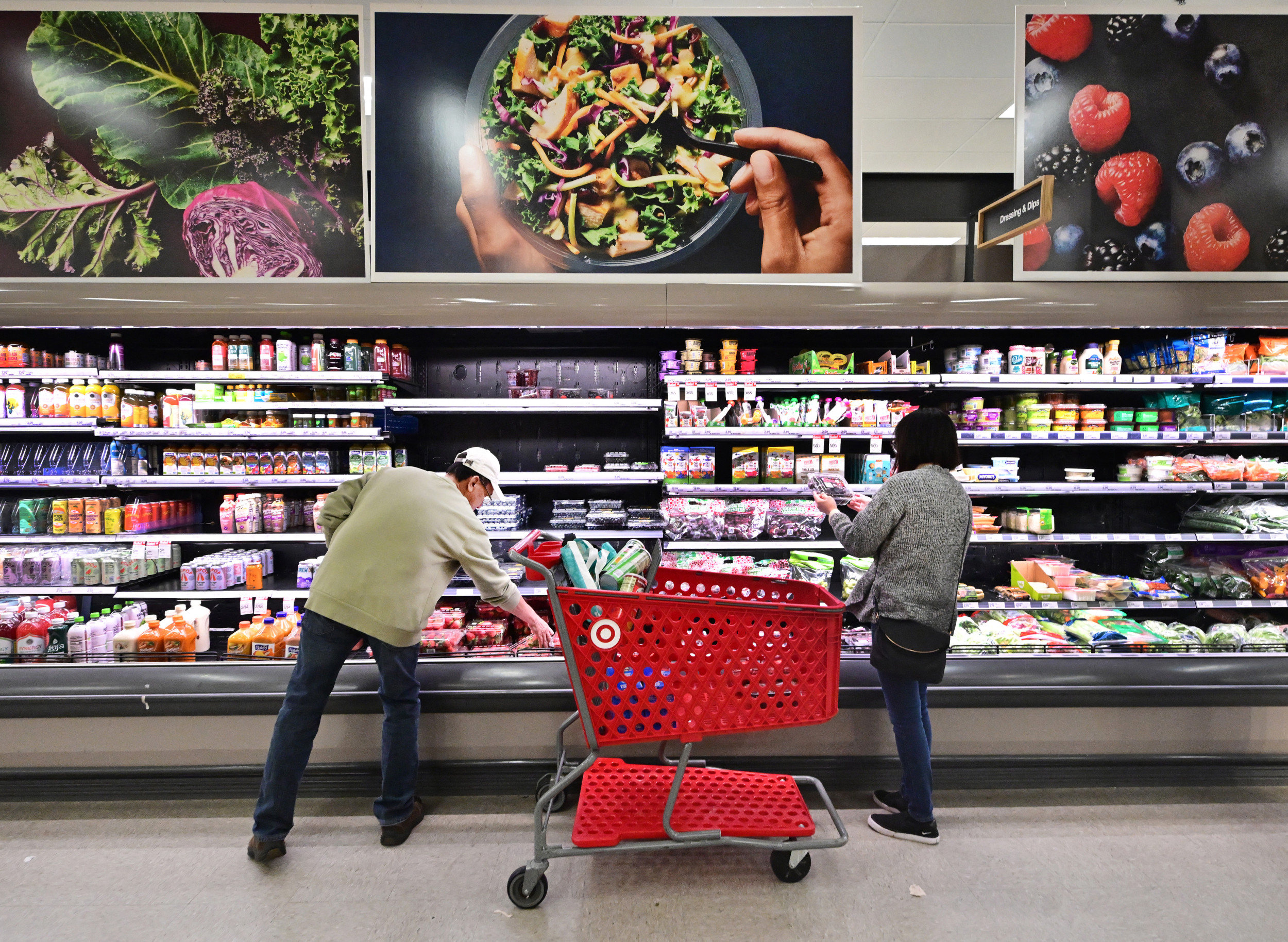Christine Maddy stretches her buck by shopping at discount stores, forgoing vacations and scrimping whenever possible to keep her family afloat. To the mother of five in rural Minnesota, that penny-pinching plan also means raising chickens, geese and ducks to offset the high cost of food.

Courtesy of Christine Maddy
Despite earning a “great wage” as a registered nurse, Maddy said she and her husband, Ryan, who works as a union crane operator, struggle to save money in a precarious economy. Yet some observers, including President Joe Biden, predict it will avoid a downturn in favor of a soft landing as inflation cools following a number of interest rate rises by the Federal Reserve.
“Yes, yes, yes,” Biden said on August 14 when asked if the U.S. had beaten inflation that had risen sharply following the COVID-19 pandemic and Russia’s 2022 invasion of Ukraine. “I told you they’re going to have a soft landing—we’re going to have a soft landing. My policies are working. Start writing that way. OK?” Maddy, 44, flatly disagrees with Biden. “That’s really out of touch with reality,” she told Newsweek. “Our wages probably total $175,000 a year, and while we can pay our bills, there’s nothing left over.”
‘Shopping Has Definitely Changed’
Maddy, of Grand Rapids, said declaring the U.S. economy as “very strong”—like International Monetary Fund Managing Director Kristalina Georgieva did in late June—feels out of touch to many Americans, citing prohibitive food costs, rising real estate taxes and escalating energy bills.
“Oh my gosh, yeah,” she said when asked if inflation had severely impacted her family in recent years. “Things that we would normally buy have just doubled or tripled in price, and we definitely feel the pinch.”
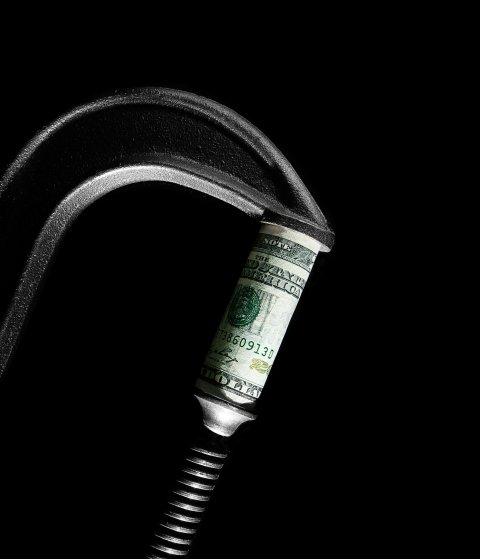
zimmytws/Getty
Prior to the coronavirus pandemic, Maddy considered her middle-class family financially stable, with frequent trips to department stores without scanning every price tag. That’s no longer the case, she acknowledged.
“Shopping has definitely changed,” she said. “I’m at the dollar store right now getting some birthday things for my daughter. I used to go to Target or a party store for that kind of stuff, but it’s just too expensive.”
Maddy also avoids local grocery stores and stocks up at discount chains like Aldi, where some items can be two-thirds less than other retailers, including Walmart, she said.
“It’s stressful,” she continued. “We’re definitely shopping differently; we don’t go on vacation. In a lot of ways, we just have to scrimp and save. Christmas has looked a lot different lately…things have been tighter. It’s impacted us in a big way.”
For Maddy’s 26-year-old son, Jack, a Navy veteran who now works as a police officer in Hibbing, Minnesota, that means sometimes working up to 80 hours per week to cover his expenses and mortgage payment in Nashwauk.
“The middle class almost suffers the most,” Maddy said. “We don’t qualify for any kind of government programs and we don’t quite make enough money to not feel the pinch. We’re kind of stuck in this middle area where we’re not worried about buying groceries tomorrow, but we work really hard.”
Maddy said she felt disregarded by Biden’s mid-August proclamation, characterizing his perspective from the White House as incomplete—despite positive economic indicators like deescalating inflation and fewer jobless claims than expected.

FREDERIC J. BROWN/AFP/Getty/Courtesy of Christine Maddy
A Major Disconnect
Wall Street is also humming along, with the Dow Jones Industrial Average eclipsing 40,000 for the first time in May and the S&P 500 surging 18 percent by August 20 since the start of the year. This jump in company valuations has helped boost pay for those at the very top in a way unimaginable to ordinary Americans.
The average American worker needs more than five lifetimes to earn what S&P 500 company CEOs make in just 12 months, according to AFL-CIO research released in early August. The top executives at S&P 500 companies took home an average of $17.7 million last year—or more than 268 times what median workers earned, the report found. Data shows Starbucks’ outgoing CEO, Laxman Narasimhan, made more than $14 million, equating to 1,028 times more than typical employees in fiscal year 2023.
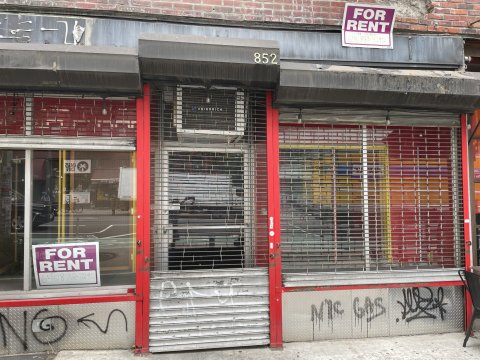
Deb Cohn-Orbach/UCG/Universal Images Group/ Getty/Courtesy of John Olsen
But that is nothing compared with what his replacement, Brian Niccol, could rake in. The former Chipotle boss, who joins Starbucks on September 9, could earn more than $100 million in his first year alone, thanks to an incentive-heavy deal.
That disparity, along with Biden’s emphatic declaration on inflation, is fueling a major disconnect for many middle-class Americans, Maddy said.
“We feel very dismissed by the current administration,” she said. “They’re telling us the economy is strong and it feels very dismissive. It feels very untrue to what all of us see in our everyday life.”
Spiraling Costs
Optimism is abounding for others, however, as the annual inflation rate dipped in July to 2.9 percent—the lowest level since March 2021—combined with encouraging jobless claims for two consecutive weeks. Retail sales also grew 1 percent in July, more than doubling Wall Street’s expectations, Census Bureau data shows. Those indicators quelled fears of a widespread downturn, but many Americans are still demoralized amid spiraling costs of food, housing and other critical goods and services, economists told Newsweek.
Jordan Rodriguez, an adviser at Wernick Spear Wealth Managers, said inflation remains a key topic of discussion among his investors, primarily small business owners.
“If you ask them what their biggest concern is, it’s not a slowing economy—the orders are still there for a lot of these folks who are in manufacturing and similar industries,” Rodriguez said. “It’s not finding good people, although that’s still a struggle because employment numbers are strong, there’s not a ton of people out there looking for work. It is, by and large, inflation.”
John Olsen, 53, of Cape Coral, Florida, recognizes that worry all too well. His one-stop shop for dog birthday parties and holistic treats, PawtyExpress.com, is struggling to stay open due to rising operating costs, including fuel and food.
Olsen opened a retail location in the “recession-proof” pet industry in October 2019, but had to shut down two years later as revenues slowed during the COVID-19 pandemic and never fully recovered. He’s now mired in credit card debt and fears his online business will soon shutter altogether, a painful reality far removed from Biden’s promise of a soft landing.
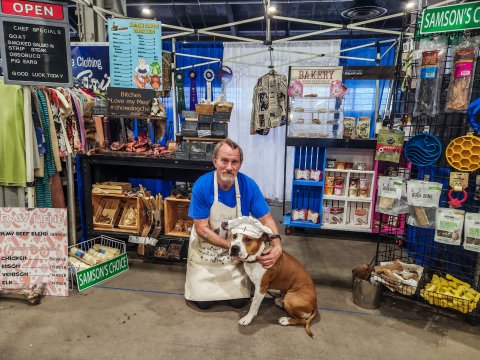
Courtesy of John Olsen
“It makes me feel like they’re trying to sell a very bad bill of goods,” Olsen told Newsweek. “They’re basing it on sources that are not nearly as reliable as the common man.”
Olsen characterized inflation—which surged to 9.1 percent in 2022, the highest level since 1981—as his biggest obstacle as a business owner. Prices for organic chicken, for example, have roughly doubled in recent years, he said, making it nearly impossible to compete with bigger retailers like Walmart and Chewy.
Many other basic goods and services remain far costlier than prior to the pandemic, such as eggs, gasoline and car insurance. The breakfast staple was about 40 percent more expensive in June compared to January 2020, according to an analysis by the Pew Research Center.
Overall food prices increased 25 percent between 2019 and last year, outpacing other major categories like housing, recreation and medical care. Costs for transportation swelled by 27.1 percent during that span, data from the Department of Agriculture shows.
Americans also paid 35.9 percent more at the pump this June than in January 2020, but the average nationwide price in late July ($3.598 per gallon) nearly matched the cost from August 2014 after almost doubling between 2020 through mid-2022.
The average gallon of gas stood at $3.382 as of August 19, down more than 48 cents from a year earlier. The cost of car insurance, meanwhile, surged 47.3 percent from January 2020 through June, along with a 47.5 percent spike in repair services, according to Pew researchers.
Credit Card Debt
“I am sitting at home on the couch because I have not been able to make enough money at the last six or seven shows to even cover expenses,” Olsen said. “We went from almost a 40-50 percent increase two-and-a-half years ago to next to nothing.”
Addison Moore, 24, is similarly worried about the months ahead while working two part-time jobs and attending vocational school in Washington, D.C., where a monthly income of $600 leaves little to no wiggle room for luxuries.
“Honestly, it’s been pretty difficult,” Moore told Newsweek. “I’ve been basically surviving off my credit cards. I try to save up what I can, which is not much, so I can at least reduce the bill instead of putting everything toward it.”
Moore, who is currently living with a friend’s family, no longer qualifies for food stamps and spends up to $100 per week on groceries. Being unable to regularly save money has made the “American Dream” seemingly impossible, they said.
“There’s so many hurdles to have to go over to get to that point,” Moore said. “It’s hard to feel like it is something achievable.”
Moore pushed back on the portrayal that the U.S. economy will avoid a recession due to cooling inflation and positive job indicators, insisting that data doesn’t necessarily translate into reality for many Americans. “Those numbers are good, but we’re not feeling good on the ground,” Moore said. “Numbers are numbers, but what’s happening on the ground is a completely different thing.”
Moore continues to rely on credit cards to survive, much like a growing number of Americans. Credit card debt reached a record $1.14 trillion in the second quarter of 2024, an increase of $27 billion and up 5.8 percent from a year ago, according to the Federal Reserve Bank of New York.
“I treat it as the income that I’ll pay back later,” Moore said of credit cards. “I’m teetering on the edge of maxing out all of them basically because life is expensive, even though I’m not spending frivolously.”
Tyler Azure, 31, of Havre, Montana, said she and her husband regularly depend on credit cards to pay monthly bills and to feed her family of 10, which can cost as much as $600 per week. “It’s insane,” Azure told Newsweek. “It makes us where we’re living paycheck to paycheck, and I don’t know how to cut it down because it’s the food that we need to
survive unless we’re eating ramen noodles for dinner.” Azure, an administrative manager who is expecting another child in January, said she’s increasingly worried about paying creditors rather than heralding brighter economic times ahead.

Courtesy of Tyler Azure
“We have three credit cards and they’re completed maxed out,” she said. “We make the minimum payments monthly, as best as we can.”
The uneven road ahead for Azure, whose family moved into a six-bedroom home in January, is wholly unsettling, she said.
“Just having the financial freedom to take care of my family, to be able to enjoy life and take them to see things that I never got to see, right now that doesn’t feel attainable to me,” Azure said. “I don’t know if I’ll ever reach it. I’d love to be hopeful, but it feels a long way off.”
Wealthier Americans are also stressing over their finances, a survey released in June revealed. Some 32.5 percent of those earning $150,000 or more annually are concerned about making ends meet in the next six months, according to the Federal
Reserve Bank of Philadelphia. That’s up from 21.7 percent a year ago among the highest-earning income bracket. Respondents making less than $40,000 represented the largest share of consumers who are worried about their future, at 40 percent, compared to 34.9 percent of all consumers polled.
“Despite recent data indicating a recession is unlikely, high interest rates, substantial debt and inflation are putting severe strain on household budgets,” WalletHub analyst Chip Lupo told Newsweek. “These threats have not gone away, even as we started the year by paying off almost $50 billion in credit card debt. We could not continue the momentum from Q1 to Q2, and things could get a lot worse in the second half of the year, when we tend to rack up the most credit card debt.”
‘Persistent Challenges’
With Federal Reserve chair Jerome Powell, in his Jackson Hole speech on August 23, signaling that the central bank was poised to cut interest rates in September, Lupo warned slashing too deep could send inflation surging again.
“The persistent challenges of high debt and inflation underscore the need for careful financial management to ensure that recent progress is not undone,” he said. “Sure, most people have jobs for now, but those jobs can’t all make ends meet without some maneuvering from consumers.”
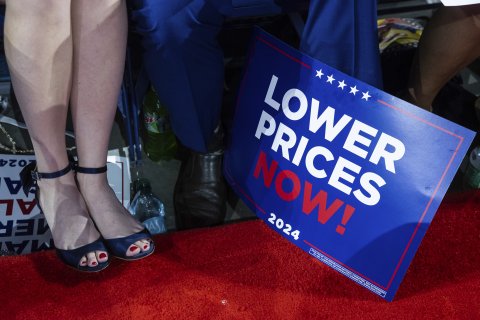
Francis Chung/POLITICO/AP/Courtesy of Addison Moore
Promising economic indicators won’t instantly reverse the lingering impact of hard times for millions of families, workplace culture expert Jessica Kriegel said. “Perception and reality are sometimes aligned and sometimes not,” Kriegel told Newsweek. “The macro data does not represent the lived experiences of Americans on a day-to-day basis.”
To properly prepare, Kriegel suggests turning inward. “The best thing that Americans can do is take accountability,” she said. “It’s not about who’s to blame, but take accountability by making a personal choice to focus on what you can control. And Americans right now need to focus on what they can control to drive results for themselves.”

Photograph by Sorendls/Getty
fairness meter
fairness meter
Newsweek is committed to journalism that’s factual and fair.
Hold us accountable and submit your rating of this article on the meter.
Newsweek is committed to journalism that’s factual and fair.
Hold us accountable and submit your rating of this article on the meter.
Click On Meter
To Rate This Article
About the writer
Joshua Rhett Miller is a Newsweek chief investigative reporter based in New York. His areas of focus include U.S. politics, …
Read more
👇Follow more 👇
👉 bdphone.com
👉 ultraactivation.com
👉 trainingreferral.com
👉 shaplafood.com
👉 bangladeshi.help
👉 www.forexdhaka.com
👉 uncommunication.com
👉 ultra-sim.com
👉 forexdhaka.com
👉 ultrafxfund.com
👉 ultractivation.com
👉 bdphoneonline.com

